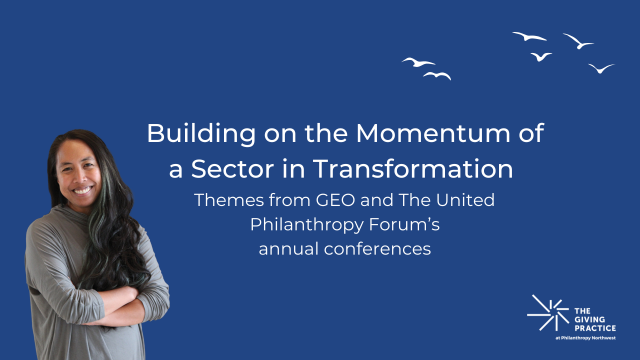
Philanthropy has long struggled with power and privilege. From who benefits from grant funding to who determines funding priorities, the power to make decisions tends to rest with those furthest away from the issues that many foundations are trying to solve. This does not have to be the case.
As a sector, we have an opportunity to shift this dynamic and explore participatory grantmaking, an “approach to philanthropy that cedes decision-making authority to the very communities affected by funding decisions.” The spectrum of participatory grantmaking is wide and can be expressed in various ways:
- Involving community members or non-grantmakers in identifying community needs;
- Determining funding priorities and criteria;
- Reviewing grant proposals and making funding recommendations; and/or
- Evaluating grant outcomes and applying learning gained through the participatory process.
This spectrum – where all or some components can be incorporated – allows foundations to decide exactly how participatory they would like their grantmaking to be.
No matter where a grantmaker is on the spectrum, the benefits of participatory grantmaking are expansive. First, and perhaps most importantly, participatory grantmaking is a tangible way to bring equity to the forefront of grantmaking. As many funders recognize diversity, equity and inclusion as foundational for effective philanthropy, the practice of bringing more voices to the table serves the goal of increasing diversity. Participatory grantmaking demonstrates trust in communities and encourages community members to share their ideas and solutions to the issues in their own lives. By creating a new place at the table AND doing the work to ensure the voice in that seat is heard and can influence decision-making, philanthropy can get one step closer to equity. Additional benefits of participatory grantmaking include providing grants that are more responsive to community-defined priorities, increasing transparency and visibility of the grantmaking process and enhancing levels of trust between community and philanthropy.
We believe in the power of participatory grantmaking to change our communities, foundations and the outcomes we seek for the better. Our hope is that foundations across the country will be curious about participatory grantmaking and test out the place(s) across the spectrum where they feel most comfortable. This is important now, more than ever, as we are living in increasingly uncertain times – in the US and globally. The current pandemic is laying bare how many of our systems do not serve the needs of most communities. It is also a reminder of our inherent interconnectedness and our most basic human need – connection. Before COVID-19, philanthropy was already exploring the growing public demand for more accountability, transparency and collaboration and the push to elevate community voice. Now, we are seeing participatory grantmaking approaches come to life in real time as funders are listening to community members, trusting them and coming together to deploy resources in ways that are responsive to community needs. We have a unique opportunity to shift how we work together and cede our power – let’s not waste it.
Additional contributions to this article were made by Leslie Silverman.
Join our email list to receive updates on our latest reflections, insights, interviews and more.


